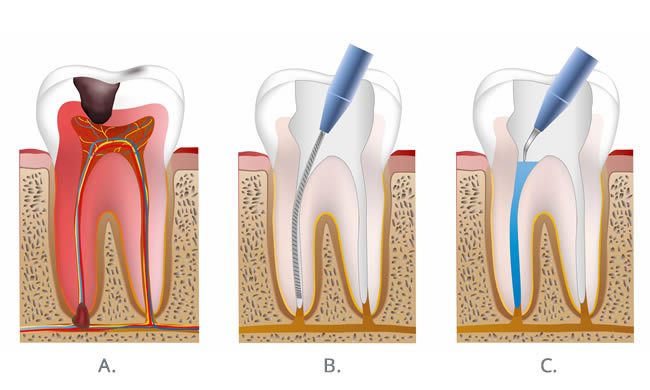Root Canal Treatment
What is a root canal?
Root canal treatment is a dental procedure that relieves pain caused by an infected or abscessed tooth. During the root canal process, the inflamed pulp is removed. The surfaces inside the tooth are then cleaned and disinfected, and a filling is placed to seal the space.
When is a root canal needed?
Root canal therapy is necessary when oral bacteria invade the pulp inside of your tooth. This usually happens when a cavity is left untreated for a long time. It can also occur if your tooth becomes cracked or damaged due to trauma.
What are some symptoms that indicate you may need root canal treatment?
In some cases, you may not know you have an infected tooth. However, many people notice certain symptoms. Signs you need a root canal include:
- Tooth pain that doesn’t go away: Many dental problems can cause tooth pain.
- If you have pain deep in your tooth, you may need root canal therapy.
- Discomfort may also radiate to your jaw, face or other teeth.
- Sensitivity to heat and cold: If your tooth hurts when you drink hot coffee or eat ice cream, it could mean that you need root canal treatment. This is especially true if the pain lingers for more than a few seconds.
- Swollen gums: When a tooth is infected, pus can collect in the area. This can lead to puffy, swollen or tender gums.
- Pimple on the gums: You may develop a pimple or boil on the gums. Pus from the infected tooth may drain from the pimple, causing an unpleasant taste or smell.
- Swollen jaw: Sometimes pus doesn’t drain from the site. As a result, your jaw may become visibly swollen.
- Tooth discoloration: When the pulp of a tooth becomes infected, it can cause your tooth to look darker. This occurs because of poor blood supply to the tooth.
- Pain when pressure is applied: If you have pain when you eat or touch your tooth, it could mean the nerves around the pulp are damaged.
- A chipped or cracked tooth: If you’ve cracked a tooth in an accident, when playing sports or even by biting down on something hard, bacteria can reach all the way into the tooth pulp.
- Loose tooth: An infected tooth may feel looser. This is because the pus from the infected pulp can soften the bone that supports the tooth.

